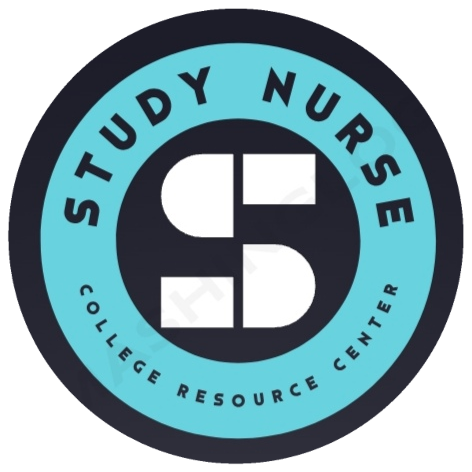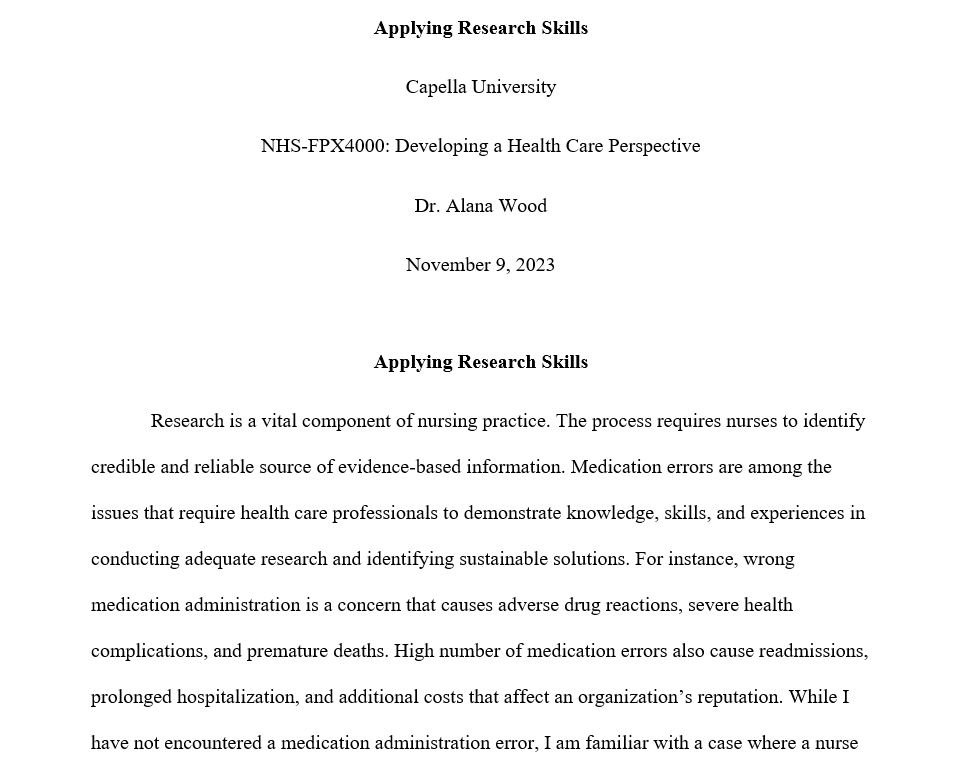Capella University
NHS-FPX4000: Developing a Health Care Perspective
Dr. Alana Wood
November 9, 2023
Applying Research Skills
Research is a vital component of nursing practice. The process requires nurses to identify credible and reliable source of evidence-based information. Medication errors are among the issues that require health care professionals to demonstrate knowledge, skills, and experiences in conducting adequate research and identifying sustainable solutions. For instance, wrong medication administration is a concern that causes adverse drug reactions, severe health complications, and premature deaths. High number of medication errors also cause readmissions, prolonged hospitalization, and additional costs that affect an organization’s reputation. While I have not encountered a medication administration error, I am familiar with a case where a nurse administered Tryptophan instead of baclofen, leading to a patient’s death. The case is among the many that reveal the need for proactive commitment to strengthening vigilance when preparing and administering medications.
Overview of the Topic
Medication errors are preventable outcomes that may cause patient harm. The common types include, incorrect dosage, failure to identify drug interactions, dispensing an incorrect medication, and wrong patient identification. Other causes of medication errors include miscommunication, ineffective patient and staff education, distractions, and poor information flow across departments (Cetin & Cebeci, 2021). Organizations should also pay close attention to issues such as ineligible handwriting, missing information, misleading labelling, and inadequate documentation (Alghamdi et al., 2019). The multiple types and causes of errors reveal the need for comprehensive frameworks characterized by robust administrative, technical, and human-related solutions. A strong safety culture, accountability and responsibility, and interdisciplinary collaboration are necessary to enhance quality and safety of patient care.
Peer-Reviewed Articles
The PubMed database is a dependable source that enhances access to current, peer-reviewed, and authoritative articles. Using keywords such as medication safety, medication administration, medication errors, and medication administration errors produced multiple article related to the topic. However, I narrowed down the search to articles published within the last two years and selected four for the annotated bibliography. On the credibility and relevance of the articles, one criterion was ensuring the four articles are peer-reviewed. The aim was to access authoritative sources with a clear purpose and published after extensive reviews by scholars. Another criterion was identifying articles published within the last three years. The reason was to use current findings to make informed conclusion on the extent of errors and implications on patients, healthcare professionals, and the organization.
Annotated Bibliography
Alghamdi, A., Keers, R., Sutherland, A., & Ashcroft, A. (2019). Prevalence and nature of medication errors and preventable adverse drug events in pediatric and neonatal intensive care settings: A systematic review. Drug Safety, 42, 1423-1436. https://link.springer.com/content/pdf/10.1007/s40264-019-00856-9.pdf
The article described the extent and nature of medication errors. The authors’ focus on a pediatric setting and ICU makes it easier for the audience to understand the severity of errors and the need for sustainable measures to enhance quality and safety of patient care. The findings indicated that dosing, prescribing, and administration errors are the most common. The authors also identified intravenous fluids, respiratory agents, and the nervous system agents as the most reported drug classes associated with medication errors. I chose the article because it provides extensive insights into the different causes of errors, drug types, and implications of adverse events on patients, the organization, and the care team.
Çetin, S & Cebeci, F. (2021). Perceptions of clinical nurses about the causes of medication administration errors: A cross-sectional study. Florence Nightingale Journal of Nursing, 29(1), 56-64. https://www.ncbi.nlm.nih.gov/pmc/articles/PMC8137725/
Cetin and Cebeci’s focus on nurse perceptions enhance awareness about the various causes of medication errors and their impact on the organization. Nurses’ frontline roles at the bedside and organizational levels make them familiar with administrative, technical, and human-related gaps that undermine the quality and safety of patient care. In this case, capturing nurses’ perceptions enhances knowledge about issues such as workload, communication problems, and staffing. Thus, the findings guide health leaders to initiate improvements such as adequate number of nurses and reduced workload necessary to enhance safety across the care continuum. I chose the article because it provides findings based on nurses’ insights into the causes of medication errors and feasible solutions to improve care outcomes.
Manias, E., Kusljic, S., & Wu, A. (2020). Interventions to reduce medication errors in adult medical and surgical settings: A systematic review. Therapeutic Advances in Drug Safe, 11, 1-28. https://journals.sagepub.com/doi/full/10.1177/2042098620968309
Manias et al. provided insights into the multiple interventions appropriate for surgical settings and adult care units. The findings highlighted the relevance of computerized prescription and reconciliation and staff education. The authors also mentioned the need for combined interventions to strengthen medication errors prevention practices. The process reinforces commitment to initiating comprehensive efforts characterized by increased awareness about issues across the organization. I chose the article because it highlights single and combined interventions that enable organizations to develop and implement an integrated approach for eliminating medication errors. The findings also provide options that enable facilities to select the interventions that match their strategic priorities.
Salami, I., Subih, M., Darwish, R., Al-Jbarat, M., Saleh, Z., Maharmeh, M., Alasad, J. & Al-Amer, R. (2019). Medication administration errors. Journal of Nursing Care Quality, 34 (2), 7-12. https://pubmed.ncbi.nlm.nih.gov/29975215/
Salami et al. reminded the audience about the adverse effects of medication administration errors and the need for sustainable solutions. Focusing on nurses’ perceptions enhances awareness about the seriousness of errors associated with wrong timing, inaccurate patient identification, and workload during night shifts. In this case, organizations can design and implement quality assurance programs by involving nurses and nurse educators in identifying the common types of medication errors and causes across nursing units. I chose the article because it focuses on nurses’ perception and their contribution towards creating and sustaining a safe clinical environment.
Lessons Learned
The task provided insights into the need for healthcare professionals to use evidence-based research skills to address health problems within and outside their facilities. The search process was an amazing experience, considering the requirement for credible and reliable evidence when addressing issues in the healthcare sector. Developing the annotated bibliography was an excellent opportunity to identify authoritative, current, and peer-reviewed sources with adequate findings on medication errors. I intend to use the lessons to enhance research skills as I aim to make a positive contribution towards addressing pressing health and patient issues.
References
Alghamdi, A., Keers, R., Sutherland, A., & Ashcroft, A. (2019). Prevalence and nature of medication errors and preventable adverse drug events in pediatric and neonatal intensive care settings: A systematic review. Drug Safety, 42, 1423-1436. https://link.springer.com/content/pdf/10.1007/s40264-019-00856-9.pdf
Çetin, S & Cebeci, F. (2021). Perceptions of clinical nurses about the causes of medication administration errors: A cross-sectional study. Florence Nightingale Journal of Nursing, 29(1), 56-64. https://www.ncbi.nlm.nih.gov/pmc/articles/PMC8137725/
Manias, E., Kusljic, S., & Wu, A. (2020). Interventions to reduce medication errors in adult medical and surgical settings: A systematic review. Therapeutic Advances in Drug Safe, 11, 1-28. https://journals.sagepub.com/doi/full/10.1177/2042098620968309
Salami, I., Subih, M., Darwish, R., Al-Jbarat, M., Saleh, Z., Maharmeh, M., Alasad, J. & Al-Amer, R. (2019). Medication administration errors. Journal of Nursing Care Quality, 34 (2), 7-12. https://pubmed.ncbi.nlm.nih.gov/29975215/

